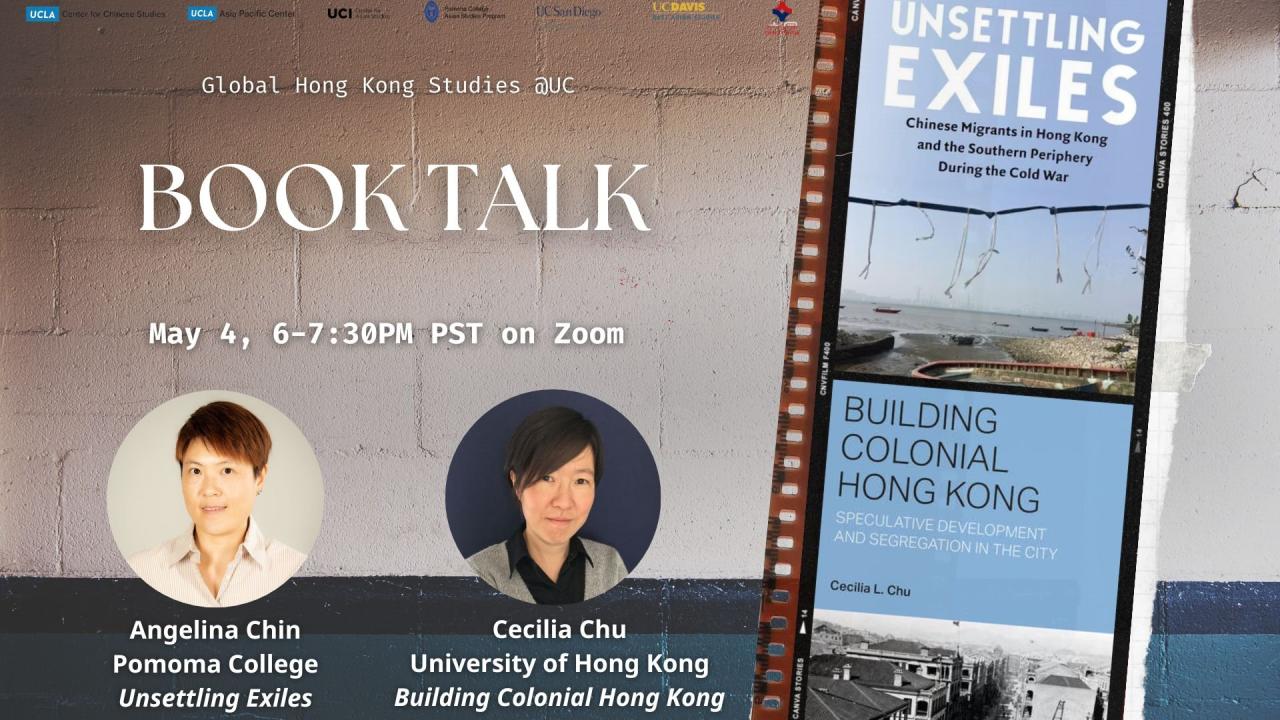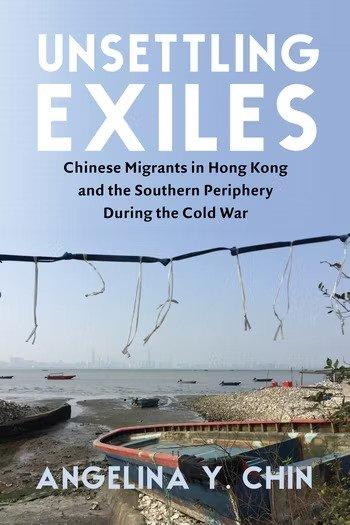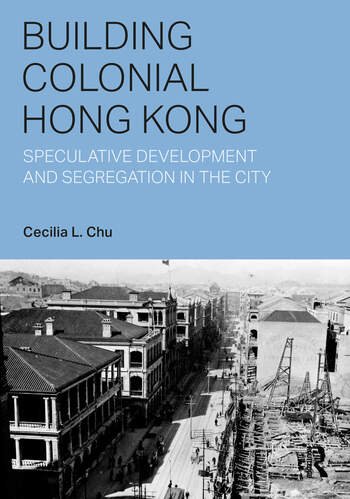
Event Date
Speakers:
Angelina Chin, Pomona College, Author of Unsettling Exiles: Chinese Migrants in Hong Kong and The Southern Periphery During the Cold War (Columbia University Press, 2023)
Cecilia Chu, University of Hong Kong, Author of Building Colonial Hong Kong: Speculative Development and Segregation in the City (Routledge, 2022)
Co-sponsors: UCLA Asian Pacific Center, UCLA Center for Chinese Studies, UC Davis East Asian Studies, UCI Center for Asian Studies, UCSD International Institute, UCSD 21st Century China Center, Pomona Asian Studies Program, Pomona College History Department
About the Event
Authors Angelina Chin and Cecilia Chu will talk about their new books Unsettling Exiles: Chinese Migrants in Hong Kong and The Southern Periphery During the Cold War (Chin 2023, Columbia University Press) and Building Colonial Hong Kong: Speculative Development and Segregation in the City (Chu 2022, Routledge).
This event is organized and hosted by Global Hong Kong Studies at the University of California
About the Authors

Angelina Chin
Associate Professor, Chair of History, Pomona College
Angelina Chin’s teaching and research focus on colonialism, diaspora and feminism in modern East Asia. Her research interests revolve around transformations of urban identity and citizenship, as well as transregional connections in Hong Kong, Taiwan and South China.
Her 2012 book Bound to Emancipate: Working Women and Urban Citizenship in Early Twentieth-Century China and Hong Kong, explored the concept of “women’s emancipation” in South China and the new concerns about such issues as identity, consumption, governance and mobility that the process helped to trigger. Her new book that will be covered in this book talk, Unsettling Exiles: Chinese Migrants in Hong Kong and The Southern Periphery During the Cold War, is set to be published on April 21st, 2023.
Unsettling Exiles: Chinese Migrants in Hong Kong and The Southern Periphery During the Cold War (Columbia University Press, 2023)
The conventional story of Hong Kong celebrates the people who fled the mainland in the wake of the establishment of the People’s Republic of China in 1949. In this telling, migrants thrived under British colonial rule, transforming Hong Kong into a cosmopolitan city and an industrial and financial hub. Unsettling Exiles recasts identity formation in Hong Kong, demonstrating that the complexities of crossing borders shaped the city’s uneasy place in the Sinophone world.
Angelina Y. Chin foregrounds the experiences of the many people who passed through Hong Kong without settling down or finding a sense of belonging, including refugees, deportees, “undesirable” residents, and members of sea communities. She emphasizes that flows of people did not stop at Hong Kong’s borders but also bled into neighboring territories such as Taiwan and Macau. Chin develops the concept of the “Southern Periphery”—the region along the southern frontier of the PRC, outside its administrative control yet closely tied to its political space. Both the PRC and governments in the Southern Periphery implemented strict migration and deportation policies in pursuit of border control, with profound consequences for people in transit. Chin argues that Hong Kong identity emerged from the collective trauma of exile and dislocation, as well as a sense of being on the margins of both the Communist and Nationalist Chinese regimes during the Cold War. Drawing on wide-ranging research, Unsettling Exiles sheds new light on Hong Kong’s ambivalent relationship to the mainland, its role in the global Cold War, and the origins of today’s political currents.
“Bold and exquisite, this book exhumes from history a “Southern Periphery” at the doorstep of the People’s Republic of China. Nurtured by the visions and voices of forgotten exiles, refugees, and deportees falling through the cracks of conventional analytical categories—nations, borders, citizenship, and diaspora—the legacies of this unique political landscape still reverberate today."
— Ching Kwan Lee, author of Hong Kong: Global China’s Restive

Cecilia Chu
Associate Professor, Division of Landscape Architecture, University of Hong Kong
Cecilia L. Chu is an associate professor in the Division of Landscape Architecture at the University of Hong Kong. Trained as an urban historian with a background in design and conservation, her works focus on the social and cultural processes that shape the forms and meanings of the built environment and their impacts on local communities. She is a co-founder and past president of DOCOMOMO Hong Kong and an editorial member of Journal of Urban History, Journal of the Royal Asiatic Society Hong Kong, Built Environment, and the ArchAsia series of Hong Kong University Press.
Chu is the author of Building Colonial Hong Kong: Speculative Development and Segregation in the City (Routledge, 2022) and co-editor of The Speculative City: Emergent Forms and Norms of the Built Environment (University of Toronto Press, 2022).
Building Colonial Hong Kong: Speculative Development and Segregation in the City (Routledge, 2022)
In the 1880s, Hong Kong was a booming colonial entrepôt, with many European, especially British, residents living in palatial mansions in the Mid-Levels and at the Peak. But it was also a ruthless migrant city where Chinese workers shared bed spaces in the crowded tenements of Taipingshan. Despite persistent inequality, Hong Kong never ceased to attract different classes of sojourners and immigrants, who strived to advance their social standing by accumulating wealth, especially through land and property speculation.
In this engaging and extensively illustrated book, Cecilia L. Chu retells the ‘Hong Kong story’ by tracing the emergence of its ‘speculative landscape’ from the late nineteenth to the early decades of the twentieth century. Through a number of pivotal case studies, she highlights the contradictory logic of colonial urban development: the encouragement of native investment that supported a laissez-faire housing market, versus the imperative to segregate the populations in a hierarchical, colonial spatial order. Crucially, she shows that the production of Hong Kong’s urban landscapes was not a top-down process, but one that evolved through ongoing negotiations between different constituencies with vested interests in property. Further, her study reveals that the built environment was key to generating and attaining individual and collective aspirations in a racially divided, highly unequal, but nevertheless upwardly mobile, modernizing colonial city.
“This is a stellar, insight-filled, and beautifully written analysis of the built environment of one of the world’s most remarkable and still-politically-charged metropolises: ‘the fragrant harbour’ (Xianggang) or, as most know it, Hong Kong.… those with an interest in Hong Kong’s evolution – from a colonial entrepôt to a Chinese city … will learn key lessons from an extremely perceptive scholar, who writes with clarity and insight.”
— Jeff Cody, The Getty Conservation Institute

